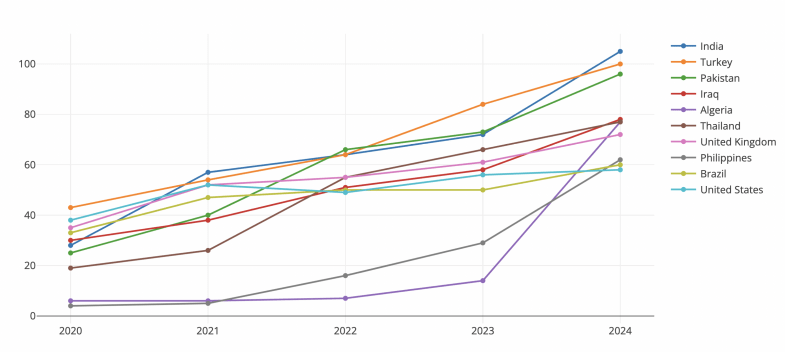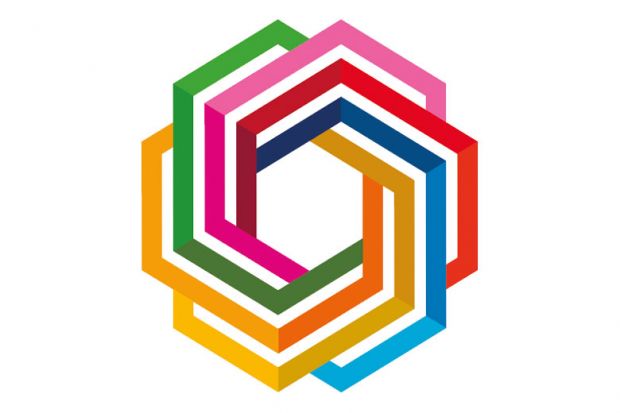More than 2,000 universities from across the world have submitted data to Times Higher Education to participate in the 2024 edition of the Impact Rankings.
This represents an increase of 26 per cent compared with last year’s participation numbers – the highest jump in three years.
With 1,053 universities submitting data, Asia is the biggest player in these rankings, which measure university performance against the United Nations’ 17 Sustainable Development Goals (SDGs).
In total, 2,152 institutions from 125 countries/regions have submitted data for the 2024 Impact Rankings, signalling that interest in the sustainability-focused league table is fast approaching that for the research-focused World University Rankings, which saw 2,673 institutions take part last year.
Top 10 countries with rising participation numbers

India, with 105 participating institutions, is now the most-represented nation in terms of submissions to the Impact Rankings, followed closely by Turkey (100) and Pakistan (96). These countries have overtaken Russia and Japan, which were last year’s top two in participation.
India’s prime minister Narendra Modi spoke about the importance of the sustainable goals and the need for an action plan to achieve them at the G20 summit in India last year.
Submissions from Africa have more than doubled in the past year, from 106 to 230, with Algeria and Nigeria notching up the biggest growth. A number of countries put themselves forward for the first time. These include Angola, Comoros, Democratic Republic of the Congo, Côte d’Ivoire, Eswatini, Malawi, Rwanda, Sierra Leone and Somalia.
Albania, Cuba, Libya, North Macedonia and Yemen are also new entrants.
Meanwhile, some individual nations have also more than doubled their representation since last year. One of these is Azerbaijan – the host of this year's United Nations Climate Change Conference (COP 29) – where 18 institutions have submitted data, up from eight in 2023.
A representative from Azerbaijan's state agency for science and higher education, said: “Hosting COP 29 signifies Azerbaijan’s firm dedication to contribute to global efforts to cope with climate change.”
Eighteen tables are published as part of the Impact Rankings – one for each of the 17 individual SDGs, plus one overall ranking. SDG 17 (partnerships for the goals) is the only goal that universities must provide data on to be included in the overall ranking.
When comparing participation for the other goals, SDG 4 (quality education) again received the most submissions, with 1,684 universities providing data in this area. This was followed by SDG 3 (good health and well-being) (1,504 institutions) and SDG 5 (gender equality) (1,361). These three goals have had the most submissions for the past three years.
Universities in Asia, Africa and South America were most likely to submit data for the tables measuring education, health and well-being, gender equality and SDG 1 (no poverty).
Oceanian universities chalked up a strong showing in SDG 16 (peace, justice and strong institutions), as well as SDG 8 (decent work and economic growth). A high share of institutions from North America submitted data for SDG 10 (reduced inequalities).
tiya.alexander@timeshighereducation.com
The Impact Rankings 2024 will be launched at THE’s Global Sustainable Development Congress, held 10-13 June in Bangkok, Thailand.
View the methodology for the Impact Rankings 2023.
We have compiled a list of frequently asked questions about our Impact Rankings, but if you have any other queries, email impact@timeshighereducation.com.
Register to continue
Why register?
- Registration is free and only takes a moment
- Once registered, you can read 3 articles a month
- Sign up for our newsletter
Subscribe
Or subscribe for unlimited access to:
- Unlimited access to news, views, insights & reviews
- Digital editions
- Digital access to THE’s university and college rankings analysis
Already registered or a current subscriber? Login








